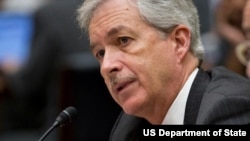“In our interconnected world, new technologies ... are remaking the relationship between citizens and governments,” U.S. Deputy Secretary of State William Burns said recently at the Community of Democracies’ Ministerial being held at Ulaanbaatar, Mongolia. “That’s why it’s so important to build the infrastructure, like the Community of Democracies and the Asia Democracy Network, to support collaboration between democracies and civil society.”
“The calls for dignity, freedom, and democracy we have heard from Tunis to Sana’a are no different from those we heard two decades ago in Warsaw or Ulaanbaatar,” Deputy Secretary Burns said.
“Look at Asia. A region long claimed by some to be ill suited for democracy, Asia today is home to India and Indonesia, the first and third-largest democracies in the world, and to democratic success stories stretching from Timor Leste to the Republic of Korea.”
“There are no regions, and no regimes, exempted from the obligation to be accountable to their citizens and respect their rights,” Mr. Burns continued. “The promise of stability, when based on the denial of human dignity and universal rights, is a false promise.”
“That is . . . why advancing democracy is not only the right thing to do – it is also the smart thing to do,” he said. “The Community of Democracies needs to become better at learning, networking, and taking concrete action.”
First, the world’s oppressive regimes share the best practices in repression – from the use of regulation to suffocate civil society, to censorship of online expression. Democracies need to innovate and share best practices for advancing open and representative government – not just with each other but with societies in transition and under repression.
Second, the information revolution provides new tools to connect citizens with each other and their governments. Democracies need to harness the potential to cultivate new ideas and new solutions.
Third, the Community of Democracies needs to continue its transformation into a body of action.
“Our citizens and circumstances demand that we do more and go farther,” Deputy Secretary Burns said in conclusion. ”Let us come together to meet this challenge and in so doing continue to offer people around the world the opportunity to one day see their nations join the community of democracies."
“The calls for dignity, freedom, and democracy we have heard from Tunis to Sana’a are no different from those we heard two decades ago in Warsaw or Ulaanbaatar,” Deputy Secretary Burns said.
There are no regions, and no regimes, exempted from the obligation to be accountable to their citizens."U.S. Deputy Secretary of State William Burns
“There are no regions, and no regimes, exempted from the obligation to be accountable to their citizens and respect their rights,” Mr. Burns continued. “The promise of stability, when based on the denial of human dignity and universal rights, is a false promise.”
“That is . . . why advancing democracy is not only the right thing to do – it is also the smart thing to do,” he said. “The Community of Democracies needs to become better at learning, networking, and taking concrete action.”
First, the world’s oppressive regimes share the best practices in repression – from the use of regulation to suffocate civil society, to censorship of online expression. Democracies need to innovate and share best practices for advancing open and representative government – not just with each other but with societies in transition and under repression.
Second, the information revolution provides new tools to connect citizens with each other and their governments. Democracies need to harness the potential to cultivate new ideas and new solutions.
Third, the Community of Democracies needs to continue its transformation into a body of action.
“Our citizens and circumstances demand that we do more and go farther,” Deputy Secretary Burns said in conclusion. ”Let us come together to meet this challenge and in so doing continue to offer people around the world the opportunity to one day see their nations join the community of democracies."






